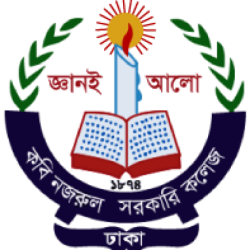MA final year admission (2021-2022)
Read More
"English is to make the learners competent communicators and user of the world
language. English enhances personally, interactive skills and imagination.
English, the language of science and technology creates opportunities to build up
life and career."

HUSNA RIDA
Professor, Head of the Department
ABOUT US
Dept. of English began its journey to meet the demand of the time with few
teachers. Right now dept. has expanded. We have been teaching honours
course since 2001 and master’s since 2009. We have nearly 1200 students at
present reading in various classes. A good number of students are qualified in
BCS exam and numerous job sectors. Most of the students are engaged in
teaching profession willingly .Some of them prefer to work in different careers
such as administration, police or multinational companies. Indeed, they have
shown their qualities to fulfil their goal and dream. We have eight teachers in our
department including 3 professors, one associate professor, one assistant
professor and three lecturers. We try our best to enlighten the young generations
to go ahead




